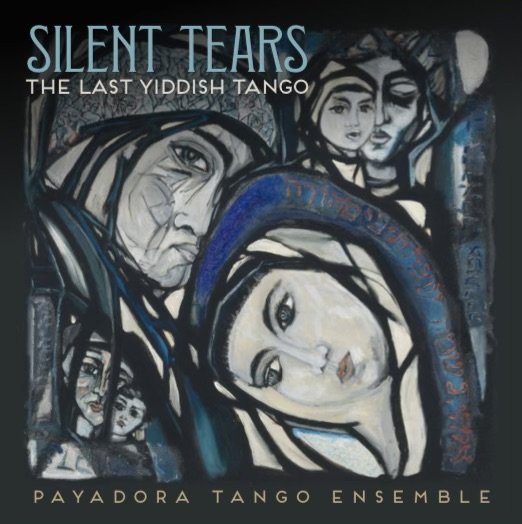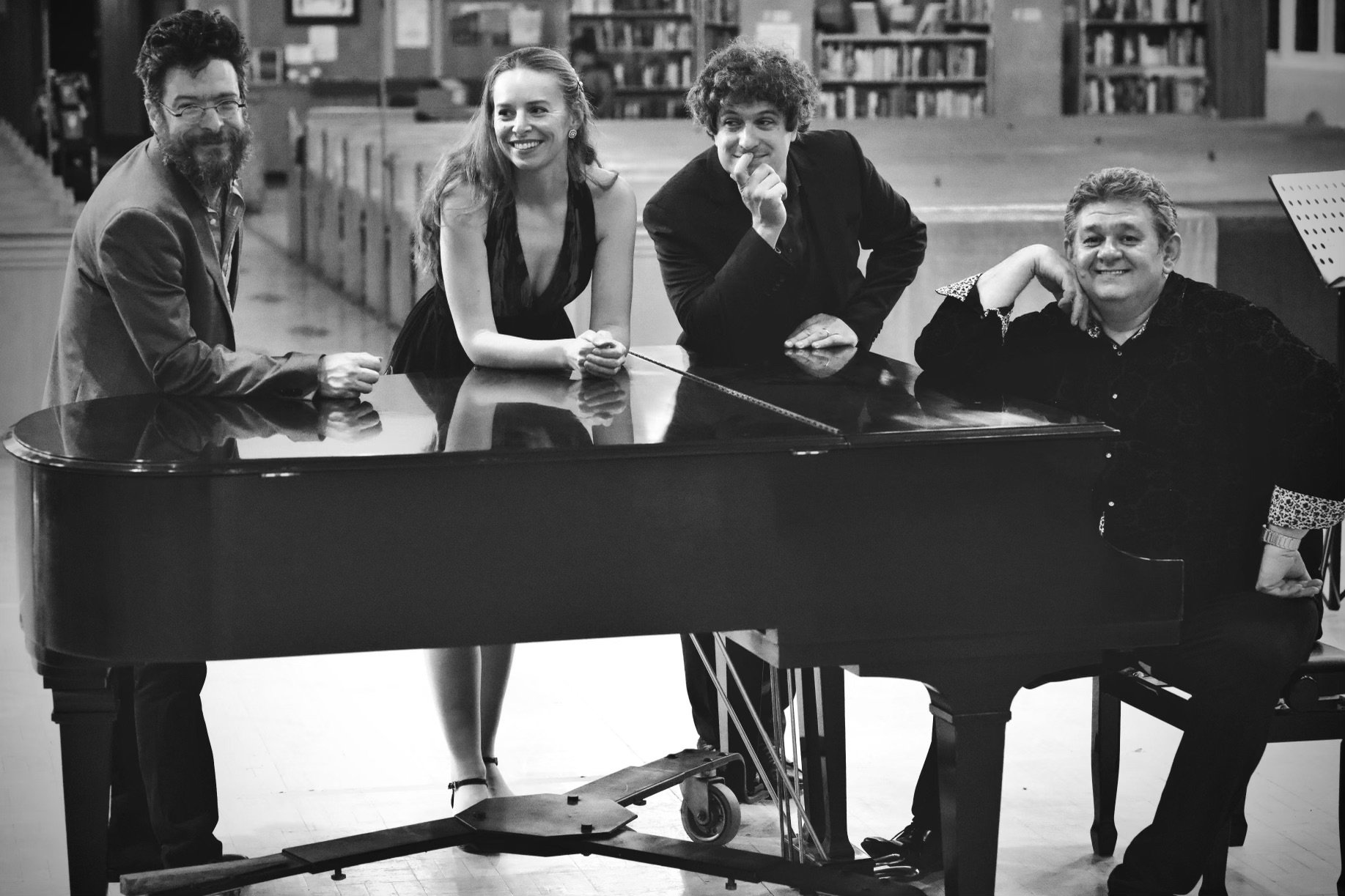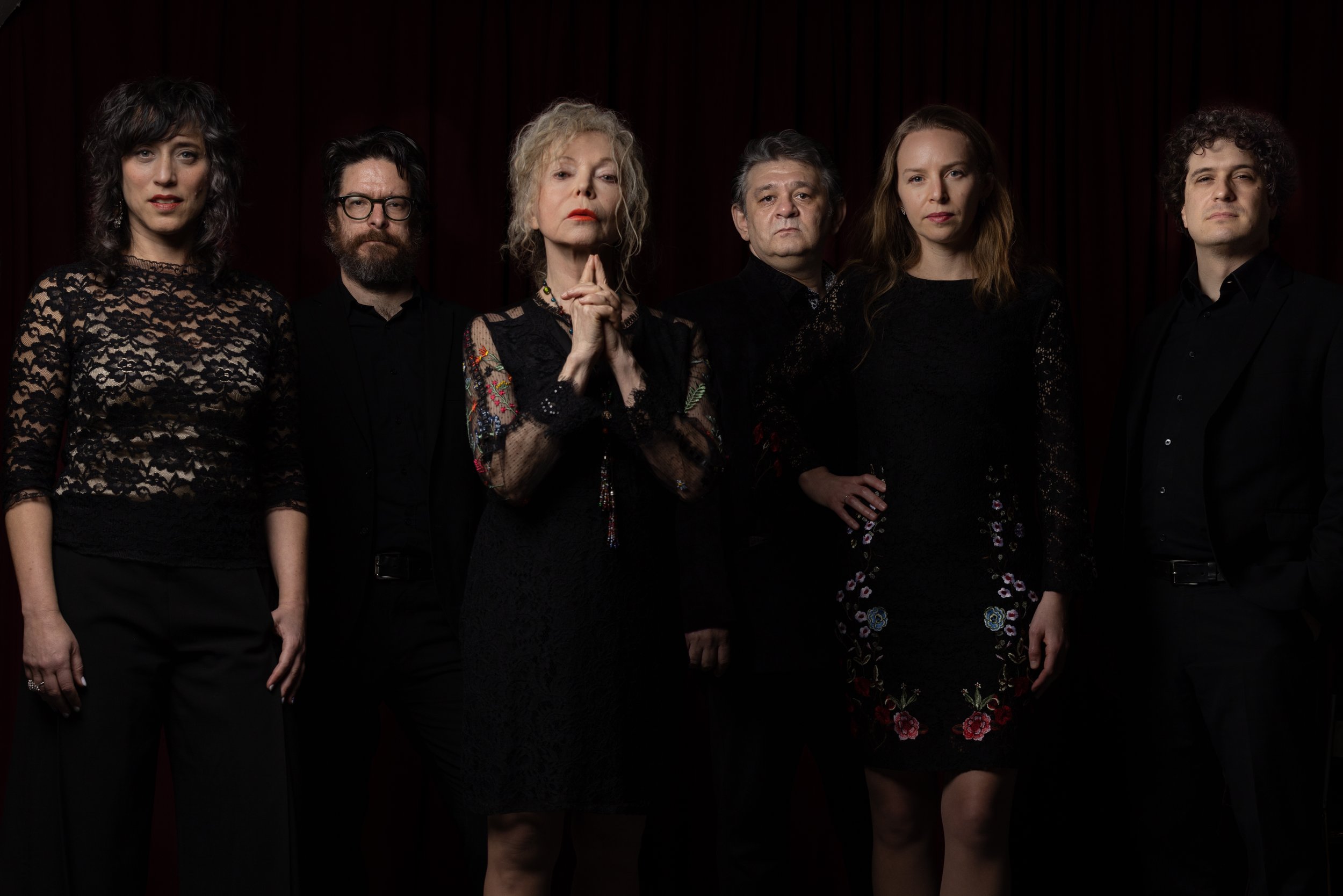On April 17th, 2023, to mark Yom Hashoah (Holocaust Remembrance Day), The New Classical FM presented Silent Tears: The Last Yiddish Tango, a concert featuring the Payadora Tango Ensemble with haunting vocals by Juno Award-winning Lenka Lichtenberg and Aviva Chernick.
From inspiring songs about survival to mournful laments, this award-winning program showcases songs inspired by the poetry of Canadian women Holocaust survivors.
"Silent Tears" is based on a poem from the Terrace Holocaust Survivors Group led by Dr. Paula David (University of Toronto) at the Baycrest Centre for Geriatric Care.
It tells the story of a mother and her three children who were on the run from Nazis, hiding in a forest - and starving. So, the mother goes to a village to try and steal some bits of food for her kids and they become separated.
Performed by Aviva Chernick and the Payadora Tango Ensemble
Music composed by Rebekah Wolkstein
Words: The Terrace Holocaust Survivors Group at the Baycrest Centre for Geriatric Care
"Some of Us Must Survive" is based on the book: Buried Words: The Diary of Molly Applebaum.
After Germany invaded Poland, Molly Applebaum's mother Sabina arranged for a farmer to hide Molly and her older cousin Helen in a barn in Dabrowa, Poland. They spend two years buried underground in a wooden box that had a small hole to breathe.
Before Molly went into hiding, she had hoped that her best friend, Sabina Goldman, would join her on that farm. Sabina wrote Molly a letter on September 11, 1942, where she urged Molly to do whatever was humanly possible to survive. Sabina explained that she had to remain with her parents who weren't in good health.
Later that week, Sabina was murdered.
Words: Molly Applebaum with Dan Rosenberg
Yiddish Translation: Aleksander Fisz
Music: Artur Gold (1897-1943)
Artur Gold was murdered in the Treblinka Death Camp
Arranged by Drew Jurecka
Performed by Olga Avigail Mieleszczuk and the Payadora Tango Ensemble
World Premiere presented by KlezKanada.
ABOUT YIDDISH TANGO
“During the interwar period (1918-1939), Warsaw became the European capital of tango, and the world capital of Yiddish tango,” explains Olga Avigail Mieleszczuk, a graduate of the Chopin University of Music in Warsaw, who has been described by the Times of Israel as the “Queen of Yiddish Tango.” “More than 3000 tangos were written during the interwar period in Poland. Many became hits, and most were written and composed by Polish Jews.”
Olga Mieleszczuk, vocalist
“Polish tango flows with Slavic-Jewish blood,” observes Mieleszczuk. “It is an Eastern European genre mixed with Jewish and Romani music. In 1939, with the outbreak of World War II, the golden age of Jewish tango ended.” Songwriter Andrzej Włast and composer Artur Gold were killed in Treblinka.
We created this album in the style of Polish tangos from the 1930s, because the women whose stories we are retelling all grew up in Poland during this period. Sadly, they never got to dance to the popular music that era in clubs, school gymnasiums or concert halls as their childhoods were spent on the run, in hiding, and in concentration camps.
-Dan Rosenberg
Dan Rosenberg is a journalist and Grammy-nominated music producer based in Toronto. He has travelled to over 40 countries reporting on arts and culture, hosts the radio program Cafe International and is a producer for Afropop Worldwide.
SILENT TEARS (Winner of “Best New Yiddish Song, 2022” at the Yiddish Music Awards presented by Kleztival in São Paulo, Brazil) Music: Rebekah Wolkstein
Payadora Tango Ensemble. photo by Alex Richardson
Rebekah Wolkstein, violin and compositions
Drew Jurecka, bandoneon, violin and music producer
Robert Horvath, piano
Joe Phillips, bass
Lenka Lichtenberg, vocalist
Aviva Chernick, vocalist
Project created by Executive Producer Dan Rosenberg
photo by Peter Yuan
photo by Peter Yuan
“I’m not sure you can heal from sexual violence, human experimentation, torture and forced sterilization. It’s learning to live again and finding what is positive in the life you have now that makes it worth living.”
-Dr. Paula David (University of Toronto, Faculty of Social Work)
SILENT TEARS: THE LAST YIDDISH TANGO
The music of “Silent Tears” is based on poems, testimonies and writings of women who were victims of sexual violence and torture during the Holocaust. Some songs are from a project led by Dr. Paula David, a social worker at a Toronto Jewish care home who helped survivors process their trauma by writing collective poetry. Others are from Molly Applebaum, a Toronto-based author, who, during her adolescent years, was buried underground in a small wooden box in a barn in Poland during the war.
Set to music by an award-winning team of musicians, the songs on the album tell the story of unimaginable violence as experienced by women and children during the Nazi occupation of Poland.
"A Victim of Mengele"
Music by Rebekah Wolkstein
Words: The Terrace Holocaust Survivors Group at the Baycrest Centre for Geriatric Care
Edited by the project's leader, Dr. Paula David (gerontologist, University of Toronto)
Adapted by Dan Rosenberg from the poem, "In the Aftermath of Dr. Mengele"
Yiddish translation by Vicky Ash
from the upcoming album:
Silent Tears: The Last Yiddish Tango
From the Terrace Holocaust Survivors Group at the Baycrest Centre for Geriatric Care in Toronto, Canada. The Group's creative expression in the form of collectively-written poems is a tangible statement to the members' strengths and survival capacities.
The Group hopes that the collective nature of the poems will speak on behalf of other survivors unable to articulate their feelings.
THE BAYCREST HOLOCAUST SURVIVOR POETRY PROJECT
By Dr. Paula David
Three of the songs of this album are based on a group poetry project that began in the 1990s by Holocaust survivors at the Baycrest Centre for Geriatric Care, one of the largest Jewish care homes in Canada. During weekly meetings, members shared intimate stories, some of which they hadn’t even told their own families.
Dr. Paula David
As a social worker in charge of the group, my job was to help its members to process their traumas. 15 women met together for several years, and created poems that reflected their collective experiences. They weren’t familiar with normal aging, let alone issues from age-related illnesses. The majority of them were orphaned because of the Holocaust, so they never had the opportunity to know or care for their own aging parents. Some suffered from dementia and Alzheimer’s, which caused their recent memory to fade, and long-term memory to become more vivid. Imagine the pain of being unable to recall the names of their beautiful grandchildren, but left with only the memories of their brutally traumatic Holocaust experiences. In 1995, The Collective Poems were published, and the survivors became authors. Their poems have now evolved into music and the Silent Tears project continues to keep their memories and hopes alive.
-Dr. Paula David
Dr. Paula David founded the Holocaust Resource Project at Baycrest which continues to support survivors living at Baycrest as well as in the community. After 20 years working with aging survivors and the people who care for them, she joined the Faculty of Social Work at the University of Toronto until her retirement.
MOLLY APPLEBAUM
Journalist Dan Rosenberg interviews Molly Applebaum
Five of the works on this album are adapted from Molly Applebaum’s survival story. Applebaum was born on October 27, 1930 in Kraków, Poland. When Germany invaded Poland in 1939, Molly was prohibited from attending school. By 1941, Jews were being rounded up and sent to death camps including Belzec. Molly’s mother, Sara Weissenberg, arranged a place for Molly and her older cousin Helen to hide with a local farmer named Victor in Dombrowa, Poland. Fearing discovery by neighbours that he was housing Jews (an offense punishable by death), the farmer refused to hide Molly’s younger brother Zygmunt (who couldn’t remain quiet) or her mother Sara. Both were later murdered by the Nazis.
Molly Applebaum as a young child
The farmer buried Molly and her cousin in a small wooden box in barn, so cramped that they couldn’t sit up, with just a small hole to breathe through. Molly kept a diary of her ordeal underground, describing the filth, hunger, thirst, cold, lice and other insects, boredom and sexual abuse.
Applebaum came to Canada after the war as a refugee, not knowing a word of English or anyone in the country. She is now 92, has 3 children, 6 grandchildren and 7 great-grandchildren. Her diary and memoir, Buried Words were published in 2017 by the Azrieli Holocaust Memoir series, won the Wolfe Chair Holocaust Studies Student Impact Prize at the University of Toronto, and is used in Holocaust education courses at top universities around the world.
Marta Kosiorek vocalist
Many thanks to Canada Council and Ontario Arts Councils for their support in this project.
Rebekah Wolkstein, violin, composer
Winner for Best New Yiddish Compostion atYiddish “Bubbe” Music Awards for Silent Tears and best new music video for Sabina’s Letter.
https://operaramblings.blog/2023/01/02/silent-tears/Review from Opera Ramblings for Silent Tears: The Last Yiddish Tango is a CD of songs based on the recollections of Holocaust survivors. Some of the songs deal with events during the Holocaust and others with the trauma of survivors. There are two main sources for the lyrics. One is the Baycrest Holocaust Surviviors Poetry Project facilitated by Dr. Paula David. The poems produced during that process were published in 1995 and adapted for this project. Other songs are based on the writings of Holocaust survivor Molly Applebaum who escaped by being buried under a barn in a small wooden box. The English texts have been adapted for this project by Dan Rosenberg and translated into Yiddish, others were originally written in Polish and remain in that tongue.
The music is based on the inter-war tango tradition in the Jewish communities of Central Europe. Some of it is newly composed by Rebekah Wolkstein and some of it is drawn from the work of composers, such as Artur Gold, who were killed in the camps. There’s also a Romani waltz played on accordion by Moldovan virtuoso Sergiu Popa reminding us that it wasn’t just Jews who were murdered by the Nazis.
These songs are incredibly moving but tough to listen to. The subject matter is horrific and somehow the upbeat music just makes them even more devastating. They are beautifully played and sung by the members of the Payadora Tango Ensemble featuring various combinations of Rebekah Wolkstein (Violin), Drew Jurecka (Bandoneon and Violin, Robert Horvath (Piano), Joseph Phillips (Double Bass), Sergiu Popa (Accordion) plus vocalists Aviva Chernick, Olga Avigail Mieleszczuk, Marta Kosiorek and Lenka Lichtenberg. The recording quality is excellent (I listened to 24 bit, 48kHz .wav files) and the documentation contains text translations and loads of useful information.
One of the tracks has also been recorded as an award winning music video. It gives a pretty good idea of what the album is all about. The CD will be officially launched in Holocaust Remembrance Week with live performances at the NAC in Ottawa (January 24th, tickets here) and Heliconian Hall in Toronto (January 25th, tickets here).
The cover illustration is by Roman Halter; the sole member of his family to survive the camps.
















